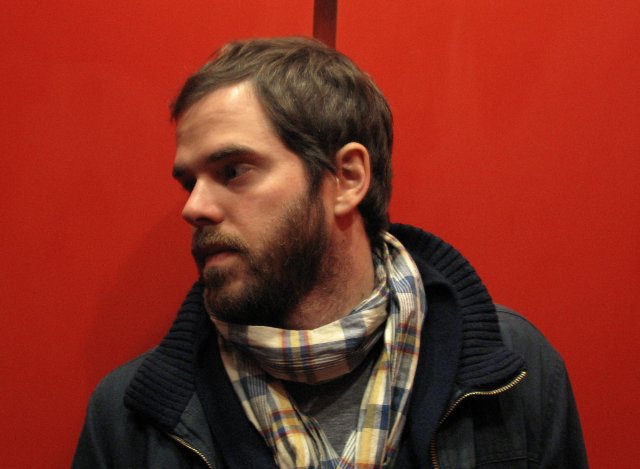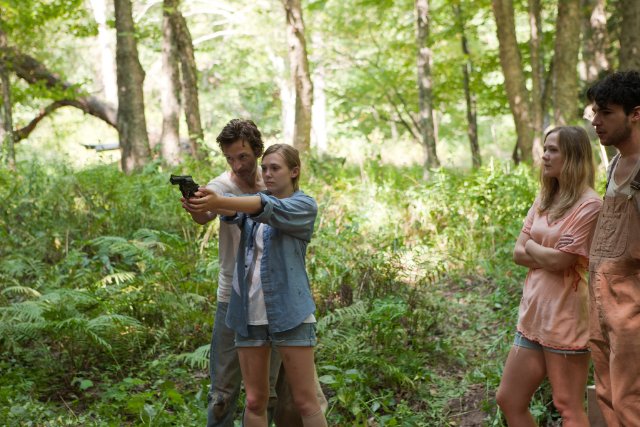Even if Sean
Durkin doesn’t win IFP's [Independent Filmmaker Project] 2011 Gotham
Awards for Breakthrough Director of The Year (held at Cipriani Wall
Street next week), he enters this season's award cavalcade through
his debut feature, Martha Marcy May Marlene (which is also
nominated for best ensemble performance).
Launched at
Sundance Film Festival 2011 and introduced to NYC audiences at this
year's New York Film Festival, the film has garnered cultish
interest for both its star, Elizabeth Olsen (herself a nominee for
breakthrough actor) and its young producer/director/writer.
MMMM's
dark tone and horror film tropes makes it more than a character
study of Martha (Olsen), a post-traumatic stress disorder (PTSD)-afflicted
escapee from an upstate New York cult. Both the isolated farm scene
of the cult and the seeming conventionality of her sister Lucy's
vacation retreat which Martha returns to offer a similar feeling of
solace and alienation for the near-catatonic Martha and audiences
alike. Such a feeling lends an almost hallucinogenic vibe to this
thriller-like, ominous tale.
Is this
film coming out of a genre like horror or suspense?
I love horror
movies, thrillers, dramas, comedies… but don’t know if it’s that. I
just believe in writing what you write to enhance the story. You can
use elements of a thriller without it being a thriller or elements
of horror without it being horror. It’s got all of those things.
 What
prompted this fascination with cults?
What
prompted this fascination with cults?
My partner
Antonio [Campos, director of Afterschool] and I were talking
one day and I said, “[Wouldn’t it be cool] to film a cult set today,
not a period piece or something where everyone’s so obviously
brainwashed, preachy and in robes? Let’s create something that’s
more the way it is when people get abducted – more from their
perspective.” It started with that. Then you have to find people’s
stories that you get really passionate about, [and try to]
understand the psychology of how confusing it is and then latch on
to certain things.
Was there a
cult that served as the model for the one in the film?
Not
specifically. I started researching some of the more famous cults of
the ‘60s and '70s, but quickly moved away from them. From the
beginning, I wanted to make a film about a cult that was set today.
I tried to find more local groups in upstate New York and Vermont.
But I really built it from how I felt this group would be in this
part of New York State, in the Catskills.
In casting
John Hawkes (an Oscar nominee) as the Manson-like Patrick, were you
referencing Manson or was the character meant to be a standard issue
cult leader?
I never
stopped to think about it that way or ask those questions. You write
a character a certain way who is influenced by many different
people. I was just trying to capture the psychology and abuse and
the way people get power. I just focused on making sure what we were
doing felt truthful in the writing. John then came in and took [what
was on] the page to another level. He’s definitely not what all cult
leaders look like, but I don’t know.
 Why
introduce the violence – wasn’t the mind/sexual control enough evil
to anchor the story?
Why
introduce the violence – wasn’t the mind/sexual control enough evil
to anchor the story?
I went back
and forth on that. I wanted the cult to appeal to a certain type of
person and to understand that this lifestyle could be appealing to
people. It was important to see that and not have everyone be
brainwashed – that was my goal from the beginning. But I always
thought that the other things happening were even worse than the
violence – the sexual abuse and the way one person makes her feel
okay about what's just happened. The stories I heard that were the
most haunting when I was doing research, they were what really
grabbed me and drew me to create this experience. Because that was
the baseline and because she can't see that those things are wrong
for somebody is so involved in it, we needed something more extreme
to be that spark [that made her leave]. It's natural for a man in
Patrick's position who's getting power and gaining a following to
take it to the next level like that. It might not be often that it
goes that far, but there are different forms of violence that I
heard about all the time.
Through
alternating flashbacks and post-escape sequences, it felt like you
shot two different films, first, the sequences before Martha leaves
the cult and then when she’s reunited with her family at the lake
house.
It was
logistical to shoot that way but also very helpful for me and the
cast to experience it [chronologically]. There was a big adjustment
when we switched over. It felt like a different movie and a
different vibe. Everything changed a bit and it was good.
What people
eat and how they sleep are really important to their indoctrination.
A few things
were consistent from all the groups that I looked at, and one was
the renaming. Everybody got renamed in every group I heard about.
The other thing [cult leaders do is] control people's consumption.
That and sleep deprivation are the first things these groups do to
weaken people and get them into a different mindset. It became
really important without spelling it out. I didn't want to spell
anything out in the movie. These are things that I read about. [I]
wanted to show this clear pattern that men ate first and women ate
separately, and that there’s only one meal a day. I thought that
when she got home, it would be really hard for her to eat in front
of people and try to do what was considered normal.
 Were most
shots in the script or developed during the shooting?
Were most
shots in the script or developed during the shooting?
It was all
scripted. For me, Martha is in a state where – although technically
they're flashbacks – I always felt that she was experiencing it all
for the first time in her confusion, and I felt like that was the
way to capture that confusion. So overall, it was scripted and there
were very specific transitions that were also scripted. The first
scene where she's at the lake, then sitting at the farm and then she
stands up and is back at the lake, that was scripted that way. There
are several things like that. When we were shooting, I would say, “I
don't know where this is going to go.” We tried to keep it free as
well as being structured. Then in the editing, you also find some
things. It was a combination but the idea and structure were always
there in the script.
Martha was
first in the cult, but life at her sister's “normal world” house
also felt cult-ish. Is the film a critique on our culture?
For me there’s
no critique. It strictly comes from her character and the group she
got caught up in, then, in going home it came from what was her
sister. Siblings can be worlds apart. So if Martha made these
choices, what choices did Lucy make, what kind of life was she
living? That just happened to be the direction I went in. The
comparisons, which are definitely clear in the film, came from
nothing other than trying to be true to the characters. I don’t have
any personal interest in making this a critique [of society].
For more
stories by Brad Balfour and further awards coverage go to:
filmfestivaltraveler.com
Email
us Let us know what you
think.